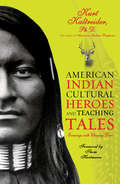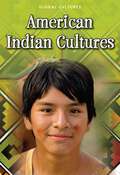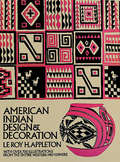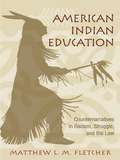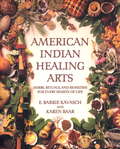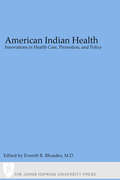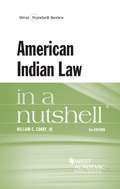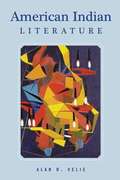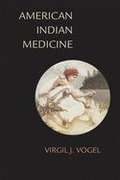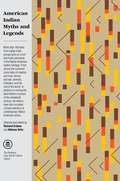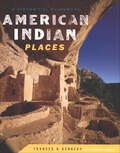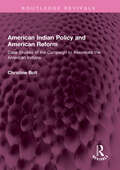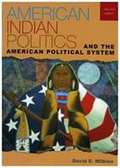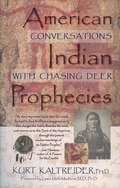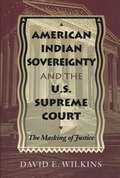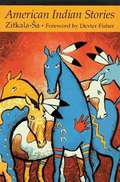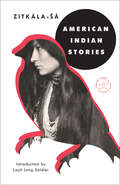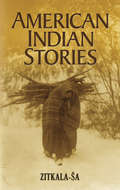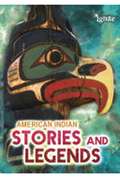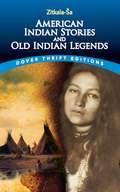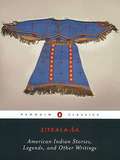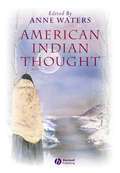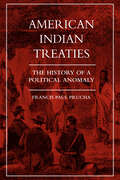- Table View
- List View
American Indian Cultural Heroes and Teaching Tales: Evenings With Chasing Deer
by Kurt KaltreiderThe first section of this books tells the tales of three great figures in American Indian culture: two of flesh and bone and one heroine of spirit. These stories give us hope that in a time of disaray and despair, a culture can be turned around to walk a more wholesome path. The second section offers yarns from the Lakota that relate the dire consequences in store for those who choose to live a life of self-centered pursuit. In all of them, we're reminded that only a life lived in integrity and service is a life worth living.
American Indian Design and Decoration
by Le Roy AppletonThe most original and most powerful design art produced in the Western Hemisphere is also its most indigenous: that of the Indian, in innumerable cultures existing from prehistory to the arrival of the white man, reaching from the Arctic Circle to Tierra del Fuego. It owes, of course, nothing to Europe or the classical Orient. It is tremendous in variety, differing region by region, era by era, often tribe by tribe. It is always vigorously distinctive. This book, 20 years in preparation, shows us that art in all its profuse diversity and in the almost numberless crafts for which the American Indian is famous. Well over 700 examples, drawn with painstaking care, are shown: representations of flora and fauna, men and gods, earth and sky; symbols of clan and tribe, religion and magic; formal designs from the primal to the highly intricate. They appear in examples of basketry, weaving, pottery, sculpture, painting, lapidary work, masks, drumheads, weapons, apparel, beadwork, goldwork, blankets, ponchos, and many other forms. The arts and crafts of Inca, Tiahuanaco, Chimú, Maya, Axtec, Zapotec, Totonac, Mixtec, Navaho, Zuni, Hopi, Apache, Cherokee, Creek, Winnebago, Dakota, Blackfoot, Nez Percé, Cheyenne, Crow, Sioux, Cochiti, Haida, Bellacoola, and others known and unknown are here. Each section is preceded by a page of typical motifs of an area, making it easy to isolate the design elements. In addition, the lore and tradition behind the designs are told in a text reproducing the Indians' own stories and songs. Separate indices simplify locating the work of particular tribes and regions. Craftspeople will find in this book a prolific source of timeless, eternally valid design ideas representing years of research in museums all over the hemisphere; for the graphic artist there is a wealth of material than can be adapted directly to his needs. All those interested in the Americans who preceded us on these continents will find this work unique.
American Indian Education: Counternarratives in Racism, Struggle, and the Law
by Matthew L. FletcherAmerica Indian culture and traditions have survived an unusual amount of oppressive federal and state educational policies intended to assimilate Indian people and destroy their cultures and languages. Yet, Indian culture, traditions, and people often continue to be treated as objects in the classroom and in the curriculum. Using a critical race theory framework and a unique "counternarrative" methodology, American Indian Education explores a host of modern educational issues facing American Indian peoples—from the impact of Indian sports mascots on students and communities, to the uses and abuses of law that often never reach a courtroom, and the intergenerational impacts of American Indian education policy on Indian children today. By interweaving empirical research with accessible composite narratives, Matthew Fletcher breaches the gap between solid educational policy and the on-the-ground reality of Indian students, highlighting the challenges faced by American Indian students and paving the way for an honest discussion about solutions.
American Indian Healing Arts
by E. Barrie KavaschAmerican Indian Healing Arts is a magical blend of plant lore, history, and living tradition that draws on a lifetime of study with native healers by herbalist and ethnobotanist E. Barrie Kavasch. Here are the time-honored tribal rituals performed to promote good health, heal illness, and bring mind and spirit into harmony with nature. Here also are dozens of safe, effective earth remedies--many of which are now being confirmed by modern research. Each chapter introduces a new stage in the life cycle, from the delightful Navajo First Smile Ceremony (welcoming a new baby) to the Apache Sunrise Ceremony (celebrating puberty) to the Seminole Old People's Dance. At the heart of the book are more than sixty easy-to-use herbal remedies--including soothing rubs for baby, a yucca face mask for troubled skin, relaxing teas, massage oils, natural insect repellents, and fragrant smudge sticks. There are also guidelines for assembling a basic American Indian medicine chest.
American Indian Health: Innovations in Health Care, Promotion, and Policy
by Everett R. RhoadesDisease processes among American Indians and Alaska Natives often have distinct manifestations that need to be considered by clinicians and health policy makers involved with these populations. Equally important, all aspects of Indian life—including health—are governed by the special relationship between Indian tribes and the U.S. federal government. For American Indian Health, Everett R. Rhoades has gathered a distinguished group of scholars and practitioners to present a comprehensive assessment of the health of American Indian peoples today and the delivery of health services to them.
American Indian Law in a Nutshell, 6th Edition
by William C. CanbyThis guide provides a reliable resource on American Indian law. The text covers the essentials of this complex body of law, with attention to the governmental policies underlying it. The work emphasizes both the historical development of Federal Indian Law and recent matters such as the evolution of Indian gaming, issues arising under the Indian Child Welfare Act, and the present enforcement of treaty rights.
American Indian Literature: An Anthology
by Alan R. VelieThe first section of this anthology contains English retellings of songs and narratives from the oral traditions of many tribes. The second half comprises poetry and novel excerpts from contemporary Native American writers, such as Louise Erdrich and N. Scott Momaday.
American Indian Medicine (The Civilization of the American Indian #95)
by Virgil J. VogelThe purpose of this book, says the author, is to show the effect of Indian medicinal practices on white civilization. It discusses Indian theories of disease and methods of combating disease and even goes into the question of which diseases were indigenous and which were brought to the Indian by the white man. It also lists Indian drugs that have won acceptance in the Pharmacopeia of the United States and the National Formulary.
American Indian Myths and Legends
by Richard Erdoes Alfonso OrtizGathering 160 tales from 80 tribal groups to offer a rich and lively panorama of the Native American mythic heritage. 100 drawings.
American Indian Persistence and Resurgence
by Karl KroeberThis collection celebrates the resurgence of Native Americans within the cultural landscape of the United States. During the past quarter century, the Native American population in the United States has seen an astonishing demographic growth reaching beyond all biological probability as increasing numbers of Americans desire to admit or to claim Native American ancestry. This volume illustrates a unique moment in history, as unprecedented numbers of Native Americans seek to create a powerful, flexible sense of cultural identity.Diverse commentators, including literary critics, anthropologists, ethnohistorians, poets and a novelist address persistent issues facing Native Americans and Native American studies today. The future of White-Indian relation, the viability of Pan-Indianism, tensions between Native Americans and North American anthropologists, and new devlopments in ethnohistory are among the topics discussed. The survival of Native Americans as recorded in this collection, an expanded edition of a special issue of boundary 2, brings into focus the dynamically adaptive values of Native American culture. Native Americans' persistence in U.S. culture--not disappearing under the pressure to assimilate or through genocidal warfare--reminds us of the extent to which any living culture is defined by the process of transformation.Contributors. Linda Ainsworth, Jonathan Boyarin, Raymomd J. DeMallie, Elaine Jahner, Karl Kroeber, William Overstreet, Douglas R. Parks, Katharine Pearce, Jarold Ramsey, Wendy Rose, Edward H. Spicer, Gerald Vizenor, Priscilla Wald
American Indian Places: A Historical Guidebook
by Frances H. KennedyThis historical guidebook includes 366 places that are significant to American Indians and open to the public. The book is organized geographically and includes location information, maps, and color photographs as well as suggestions for further reading about the sites and an extensive bibliography.Among the 279 authorities who know and revere these places and have written essays on them and on topics relating to them are William deBuys, Suzan Shown Harjo, Frederick E. Hoxie, Clara Sue Kidwell, Malinda Maynor Lowery, Rennard Strickland, and David Hurst Thomas. Tribal culture committees and tribal historians also contributed essays. Frances H. Kennedy, the editor and principal contributor, has written short entries on more than a hundred of the places.The places covered in the book include: Ganondagan State Historic Site in New York Kituhwa Mound in North Carolina, Cahokia Mounds State Historic Site in Illinois, Crystal River Archaeological State Park in Florida, Effigy Mounds National Monument in Iowa, Devils Tower National Monument in Wyoming, Chaco Culture National Historical Park in New Mexico, Navajo National Monument in Arizona, Olompali State Historic Park in California, La Purisima Mission State Historic Park in California, Nez Perce National Historical Park in Idaho.
American Indian Policy and American Reform: Case Studies of the Campaign to Assimilate the American Indians (Routledge Revivals)
by Christine BoltFirst published in 1987, American Indian Policy and American Reform examines key aspects of American Indian policy and reform in the context of American ethnic problems and traditions of reform. The first four chapters provide a chronological survey discussing racial attitudes, economic issues, the role of the Bureau of Indian Affairs, missionary and reformer involvement with government policy, the political interaction of Indians and whites, and other continuing differences between the two races. The second part of the book examines important themes which illuminate the difficulties of the assimilation campaign. In a series of case studies, Prof. Bolt explores Indian-black-white relations in the South and Indian Territory, American anthropologists and American Indians, Indian education from colonial times to the 20th century, Indian women, urban Indians since the Second World War and Indian political protest groups. This book will be of interest to students of American history, ‘minority’ history and race relations.
American Indian Policy in the Twentieth Century
by Vine Deloria Jr.A paperback reprint of the important collection of essays on federal Indian policy originally published in 1985 by the U. of Oklahoma Press.
American Indian Politics and the American Political System (2nd edition)
by David E. WilkinsIn this college textbook, Wilkins (American Indian studies, political science, law, and American studies, U. of Minnesota) considers the relationship of American Indian governments to the American political system with emphasis on the sovereignty of tribal nations. He analyzes the status of indigenous peoples and their citizenship, the concept of tribal sovereignty and the issues policymakers have, and their relationship with the government's branches. He provides an overview of federal Indian policy in history, descriptions of tribal governments, political economy and gaming, participation, interest-group activities and social activism, and the effect of the media. This edition integrates new census data; discussions of changes to elections, US House and Senate personnel, and legislation on Indian rights and the state-tribal relationship; and information on George W. Bush's terms in office. Annotation ©2006 Book News, Inc., Portland, OR (booknews.com)
American Indian Prophecies: Conversations With Chasing Deer
by Kurt KaltreiderAmerican Indian Prophecies: Conversations with Chasing Deer tells of indigenous American culture, values, and spirituality as seen through their prophecies. The book is a series of conversations between young John Peabody of the New England gentry and Chasing Deer, an aged Cheyenne/Lakota and keeper of the true history of the Americas. As the conversations unfold, you see the contrast between Euro-American and American Indian cultures and values, bringing many interesting questions to light. As the conversations unfold, we learn that perhaps the Amercian Indian culture has some of the answers that we are all looking for.
American Indian Sovereignty and the U.S. Supreme Court: The Masking of Justice
by David E. Wilkins"Like the miner's canary, the Indian marks the shift from fresh air to poison gas in our political atmosphere; and our treatment of Indians, even more than our treatment of other minorities, reflects the rise and fall in our democratic faith," wrote Felix S. Cohen, an early expert in Indian legal affairs. In this book, David Wilkins charts the "fall in our democratic faith" through fifteen landmark cases in which the Supreme Court significantly curtailed Indian rights. He offers compelling evidence that Supreme Court justices selectively used precedents and facts, both historical and contemporary, to arrive at decisions that have undermined tribal sovereignty, legitimated massive tribal land losses, sanctioned the diminishment of Indian religious rights, and curtailed other rights as well. These case studies-and their implications for all minority groups-make important and troubling reading at a time when the Supreme Court is at the vortex of political and moral developments that are redefining the nature of American government, transforming the relationship between the legal and political branches, and altering the very meaning of federalism.
American Indian Stories
by Zitkala-saAutobiography of Zitkala-Sa (aka Gertrude Bonnin), a Dakota Sioux Indian, and tales she heard from the oral tradition of her tribe. First published in 1921.
American Indian Stories (Modern Library Torchbearers)
by Zitkala-SaA groundbreaking Dakota author and activist chronicles her refusal to assimilate into nineteenth-century white society and her mission to preserve her culture—with an introduction by Layli Long Soldier, winner of the National Book Critics Circle Award and the PEN/Jean Stein Book Award for Whereas Bright and carefree, Zitkála-Šá grows up on the Yankton Sioux reservation in South Dakota with her mother until Quaker missionaries arrive, offering the reservation’s children a free education. The catch: They must leave their parents behind and travel to Indiana. Curious about the world beyond the reservation, Zitkála-Šá begs her mother to let her go—and her mother, aware of the advantages that an education offers, reluctantly agrees. But the missionary school is not the adventure that Zitkála-Šá expected: The school is a strict one, her long hair is cut short, and only English is spoken. She encounters racism and ridicule. Slowly, Zitkála-Šá adapts to her environment—excelling at her studies, winning prizes for essay-writing and oration. But the price of success is estrangement from her cultural roots—and is it one she is willing to pay? Combining Zitkála-Šá’s childhood memories, her short stories, and her poetry, American Indian Stories is the origin story of an activist in the making, a remarkable woman whose extraordinary career deserves wider recognition.The Modern Library Torchbearers series features women who wrote on their own terms, with boldness, creativity, and a spirit of resistance.
American Indian Stories (Native American)
by Zitkala-SaBorn on South Dakota's Yankton Reservation in 1876, Zitkala-Sa felt "as free as the wind that blew my hair, and no less spirited than a bounding deer." At the age of 8, she traded her freedom for the iron discipline of a Quaker boarding school. Forever afterward, the Lakota Sioux author struggled to find a balance between Indian and white society. These autobiographical essays, short stories, and political writings offer her poignant reflections on being stranded between two worlds. Zitkala-Sa, who attended and taught at the Carlisle Indian Industrial School in Pennsylvania, was a founder of the National Council of American Indians and among the first Native Americans to record tribal legends and oral traditions. This collection opens with her reminiscences of the reservation, her schooling at an institution determined to "civilize" Indians, and her experiences as a teacher. Zitkala-Sa also recounts tales rooted in Sioux traditions, including "A Warrior's Daughter," in which a courageous woman risks everything for her husband-to-be; "The Trial Path," an account of tribal justice after a murder; and "The Sioux," in which a son must kill twice to save his father from starvation. The book concludes with incisive observations on government mistreatment of Indians and a call for the complete enfranchisement of Native Americans into mainstream society.
American Indian Stories and Legends (All About Myths)
by Catherine ChambersAmerican Indians have always told stories filled with characters, creatures, and legends that have fascinated people around the world. This book mixes dramatic retellings and nonfiction information to give a full picture of American Indian stories, exploring the gods, goddesses, heroes, villains, tricksters, and quests that make American Indian stories and legends so compelling.
American Indian Stories and Old Indian Legends (Dover Thrift Editions)
by Zitkala-sa"Whether your interest in Sioux folklore is great or small, you will find this a fascinating book to devour. Pick up a copy today and be thrilled." -- The Reading RoomThis accessible and affordable volume combines two essential collections by Sioux author Zitkala-Sa. American Indian Stories assembles short stories, autobiographical reflections, and political essays that offer poignant reflections on the author's sense of being stranded between the white and Native American worlds. Old Indian Legends features tales from the oral tradition -- legends passed down through the generations that form a genre known as the "retold tale." Born on South Dakota's Yankton Reservation in 1876, Zitkala-Sa felt "as free as the wind that blew my hair, and no less spirited than a bounding deer." At the age of eight, she traded her freedom for the iron discipline of a Quaker boarding school. Disillusioned by American society as well as her own tribe, Zitkala-Sa attended college, became a teacher, and wrote about her experiences in a variety of books and magazines. A prominent advocate for Native American rights throughout her life, she was a key figure in the legislation that granted Native Americans citizenship in 1924.
American Indian Stories, Legends, and Other Writings
by Zitkala-saZitkala-Sa wrestled with the conflicting influences of American Indian and white culture throughout her life. Raised on a Sioux reservation, she was educated at boarding schools that enforced assimilation and was witness to major events in white-Indian relations in the late 1800s and early 1900s. Tapping her troubled personal history, Zitkala-Sa created stories that illuminate the tragedy and complexity of the American Indian experience. In evocative prose laced with political savvy, she forces new thinking about the perceptions, assumptions, and customs of both Sioux and white cultures and raises issues of assimilation, identity, and race relations that remain compelling today. .
American Indian Thought: Philosophical Essays
by Anne WatersThis book brings together a diverse group of American Indian thinkers to discuss traditional and contemporary philosophies and philosophical issues.
American Indian Treaties: The History of a Political Anomaly
by Francis Paul PruchaAmerican Indian affairs are much in the public mind today—hotly contested debates over such issues as Indian fishing rights, land claims, and reservation gambling hold our attention. While the unique legal status of American Indians rests on the historical treaty relationship between Indian tribes and the federal government, until now there has been no comprehensive history of these treaties and their role in American life.Francis Paul Prucha, a leading authority on the history of American Indian affairs, argues that the treaties were a political anomaly from the very beginning. The term "treaty" implies a contract between sovereign independent nations, yet Indians were always in a position of inequality and dependence as negotiators, a fact that complicates their current attempts to regain their rights and tribal sovereignty.Prucha's impeccably researched book, based on a close analysis of every treaty, makes possible a thorough understanding of a legal dilemma whose legacy is so palpably felt today.
